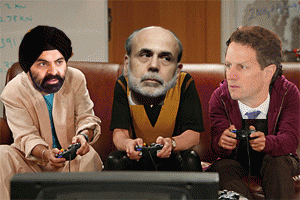Upon hearing this news the collective yelp of "Ouch!" from lower Manhattan was loud enough to be heard in Topeka, KS, but never crossed the transom of the mainstream media.
There's no doubt the public's abandonment of this high cost alternative to cash is causing a great deal of gnashing of teeth, sweaty palms and blazing calculators in the banking sector, not to mention on the desks of Wall Street finance analysts.
TransUnion, the source of the worrisome report put the best spin on it they could: most people are using some other form of credit, and the decrease is due to charge-offs in higher credit risk segments, and consumers are acting to maintain their good credit. (Source: TransUnion.com)
This may all be true as far as it goes, but...
Your credit score goes down when you close an active credit card account.
And, average total debt in 2009 (includes credit cards, mortgage, home equity, student loans and other debt) for U.S. households was $54,000, down a whopping $34,850 from 2008, a decrease of over 42% in one year. (Source: Federal Reserve's G.19 report, March 2010)
And, credit card advertising campaigns are in full swing; mailings of offers continue unabated.
And, 29% of those recently polled said they do not have a credit card. (Source: 2009 scientific poll conducted for CreditCards.com)
Personal Finance Expert for Credit.com Gerri Detweiler, an advocate for fair credit since 1987, offered a fourth reason: "We don't know how many, but some credit cardholders I've spoken with are angered by how they were treated before the Credit Card Accountability, Responsibility, and Disclosure (CARD) Act of 2009 was passed," referring to the drastic cuts in credit limits, over limit fees, late charges and drastic sudden interest rate increases.
Why don't we know how many Americans may be "financial insurgents" giving up plastic to deny money to the banking industry? The data needed to do such an analysis is not public. The credit card and reporting companies have probably done the math of the backlash, but why tell Americans that voting with their feet is succeeding at the industry's expense?
Adding to the growing public discontent is the continuing victory of the banks to be profitable while withholding credit. Yes, banks paying back their TARP bailout loans with interest make big news. But most Americans would rather have more robust employment. The fact that the banks have constrained lending is acknowledged as a contributing factor to the continuing high unemployment and de facto recession on Main Street.
Does the public rightly see credit as no longer a banking service but as a political sledgehammer being applied to the underpaid workers of America?
Some Americans are acutely aware of this change. With the widespread curtailment of business loans and lines of credit, micro business* owners have been forced to finance their enterprises with credit cards at an average interest rate of over 14%.
Back to Mr. Banga, who so recently declared "war on cash." According to the New York Times, "Who Needs Cash (or Borders)? by Vikas Bajaj and Andrew Martin, October 16, 2010, from 2000 to 2002, Mr. Banga ran CitiFinancial and it was, "his task to clean up the unit, which became part of Citigroup in an acquisition."
The Times story isn't clear about timeline but it's important. Banga joined Citicorp in 1996. Citicorp then merged with Travelers Group in 1998 to form the first financial power house in defiance of the Glass-Steagall Act of 1933. With that merger came the acquisition of the CitiFinancial sub-prime loan business.
(Note: You can view every article as one long page if you sign up as an Advocate Member, or higher).





